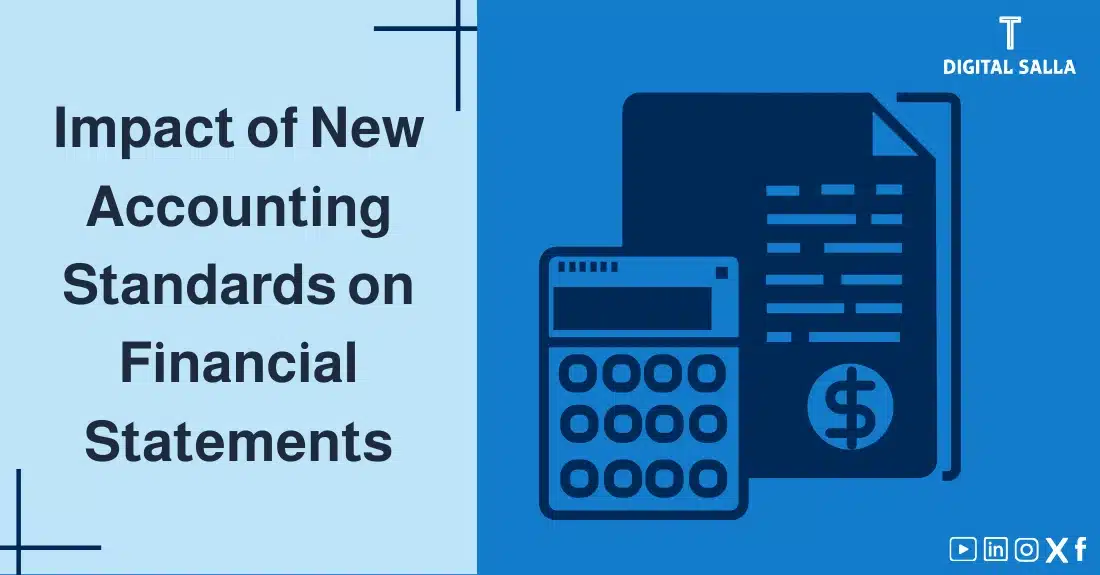Impact of New Accounting Standards on Financial Statements

Financial statements provide crucial information about an entity’s performance and financial position, and the quality of these statements depends largely on the accounting standards used in their preparation. With the constant development of the business environment, there is a need to update accounting standards to keep pace with these developments and to better meet the needs of users of financial statements. This article will discuss the Impact of New accounting Standards on Financial Statements, and Analyse how those standards can lead to fundamental changes in measuring and presenting assets, liabilities, revenues, and expenses, focusing on how important it is for accountants, investors and other stakeholders to understand these changes.
What are Accounting Standards?
Accounting standards are a set of principles, guidelines, and rules that govern how financial statements are prepared and presented. These standards aim to ensure the consistency, reliability, and comparability of financial information provided by companies.
What are New Accounting Standards?
The term “Evolving Accounting Standards” refers to the latest versions or amendments made to existing accounting standards, which affect how financial statements are prepared and presented. These standards are usually issued by bodies responsible for setting accounting standards, such as the International Accounting Standards Board (IASB), which issues International Financial Reporting Standards (IFRS), and the Financial Accounting Standards Board (FASB), 1 which issues Generally Accepted Accounting Principles (GAAP) in the United States. Keeping up-to-date with New Accounting Standards is critical for all preparers of financial reports
Examples of New Accounting Standards:
- IFRS 15, “Revenue from Contracts with Customers”: This standard led to significant changes in how revenue is recognized.
- IFRS 16, “Leases”: This standard led to a significant change in lease accounting by lessees.
- IFRS 9, “Financial Instruments”: This standard led to changes in the classification and measurement of financial instruments and in the expected credit loss model.
- IFRS 17, “Insurance Contracts”: This standard introduces a new and comprehensive accounting model for insurance contracts. This is another example of how Evolving Accounting Standards can reshape entire industries.
Importance of Understanding the Impact of New Accounting Standards:
- Ensuring Compliance: Companies must comply with Evolving Accounting Standards when preparing financial statements.
- Avoiding Errors: Understanding Evolving Accounting Standards helps avoid errors in preparing financial statements.
- Improving the Quality of Financial Reporting: Evolving Accounting Standards lead to improved quality, relevance, and reliability of the financial information provided.
- Making Better Decisions: Understanding the impact of Evolving Accounting Standards on financial statements helps investors, creditors, and other stakeholders make more informed economic decisions.
- Assessing the Impact of Changes on Company Performance: Evolving Accounting Standards can lead to significant changes in the figures in the financial statements, which may affect investors’ assessment of the company’s performance. Careful analysis of disclosures is vital.
How New Accounting Standards Affect Financial Statements:
New Accounting Standards can affect financial statements in multiple ways, including:
- Impact on Recognition and Measurement:
- New Accounting Standards may lead to changes in how certain items of assets, liabilities, revenues, and expenses are recognized.
- New Accounting Standards may result in changing the way certain items are measured, such as the utilization of fair value instead of the historical cost.
- Impact on Presentation and Disclosure:
- New Accounting Standards may require changes in the way certain items are presented in the financial statements.
- New Accounting Standards may increase the volume and scope of disclosures required in the financial statements. Companies must ensure they meet all disclosure requirements.
- Impact on Financial Ratios:
- New Accounting Standards may lead to changes in key financial ratios, such as profitability, liquidity, and solvency ratios.
- Impact on Reported Earnings:
- New Accounting Standards may lead to changes in reported earnings, which may affect investors’ assessment of the company.
- Impact on Taxes: * New Accounting Standards may result in changes in taxable income.
Detailed Examples of the Impact of Some New Accounting Standards:
- IFRS 15 – Revenue from Contracts with Customers:
- Impact: IFRS 15 fundamentally changed how revenue is recognized, by introducing a five-step model that depends on identifying performance obligations in the contract and recognizing revenue when those obligations are satisfied. The impact of New Accounting Standards like this one can be far-reaching.
- Impact on the Income Statement: IFRS 15 may lead to a change in the timing of revenue recognition, which may affect the entity’s reported revenues, expenses, and profits in specific periods.
- Impact on the Statement of Financial Position: IFRS 15 may lead to the recognition of new assets and liabilities related to contracts with customers, such as contract assets and contract liabilities.
- IFRS 16 – Leases:
- Impact: IFRS 16 eliminated the distinction between finance and operating leases from the lessee’s perspective, and it requires lessees to recognize a right-of-use asset and a lease liability on the Statement of Financial Position for most leases. It’s important to note that New Accounting Standards, such as IFRS16, will require time to implement.
- Impact on the Statement of Financial Position: IFRS 16 led to a significant increase in the assets and liabilities of companies that use operating leases.
- Impact on the Income Statement: IFRS 16 leads to a change in the classification of lease expense, as depreciation expense on the right-of-use asset and interest expense on the lease liability are recognized instead of operating lease expense.
- IFRS 9 – Financial Instruments:
- Impact: IFRS 9 changed how financial instruments are classified and measured, and introduced a new expected credit loss model. The ripple effect of New Accounting Standards is always an important consideration.
- Impact on the Statement of Financial Position: IFRS 9 may lead to changes in how financial instruments are measured, which may affect their values on the Statement of Financial Position.
- Impact on the Income Statement: The expected credit loss model in IFRS 9 leads to earlier recognition of credit losses, which may affect credit loss expense and net profit.
Steps to Deal with the Impact of New Accounting Standards:
- Understand the Requirements of the New Standard: Companies must carefully study the New Accounting Standards and fully understand their requirements.
- Assess the Impact of the New Standard: Companies must assess the impact of applying the new standard on the financial statements, accounting systems, and processes. This is where the full scope of New Accounting Standards becomes apparent.
- Identify Necessary Changes: Necessary changes in Accounting Policies, systems, and processes must be identified to ensure compliance with the new standard.
- Develop an Implementation Plan: A detailed plan for implementing the new standard should be developed, including the timeline, required resources, and responsibilities.
- Train Employees: Employees must be trained on the requirements of the new standard and how to apply it. Training programs should emphasize the implications of New Accounting Standards.
- Test New Systems and Processes: New systems and processes must be tested before the new standard is actually applied.
- Communicate with Stakeholders: Companies must communicate with stakeholders, such as investors and creditors, to explain the impact of the new standard on the financial statements. Transparency is crucial.
- Disclose the Impact of the New Standard: Companies must clearly and transparently disclose the impact of applying the new standard on the financial statements. This disclosure helps users understand the changes.
Role of Technology in Facilitating the Application of New Accounting Standards:
Accounting software and Enterprise Resource Planning (ERP) systems can help facilitate the application of New Accounting Standards by:
- Automating accounting processes according to the new requirements.
- Providing tools to remeasure assets and liabilities according to the New Accounting Standards.
- Managing the process of preparing the required disclosures.
- Generating financial reports that comply with the New Accounting Standards.
- Improving the accuracy and efficiency of the financial reporting process. Software upgrades are often required.
Importance of Analyzing the Impact of New Accounting Standards:
Analyzing the impact of New Accounting Standards on financial statements is crucial for the following reasons:
- Understanding Changes in Financial Performance: The analysis helps understand how New Accounting Standards affect the entity’s revenues, expenses, and profitability.
- Assessing the Impact of Changes on Financial Position: The analysis helps understand how New Accounting Standards affect the entity’s assets, liabilities, and equity.
- Identifying Risks and Opportunities: The analysis helps identify risks and opportunities arising from the application of New Accounting Standards. Proactive analysis is crucial.
- Making Informed Management Decisions: The analysis provides valuable information that helps management make decisions about how to respond to New Accounting Standards.
- Communicating with Stakeholders: The analysis helps explain the impact of New Accounting Standards on financial statements to stakeholders, such as investors and creditors. Clear communication builds trust.
Conclusion
New Accounting Standards have a significant impact on the financial statements, and staying up-to-date is an ongoing process for firms. The implementation of New Accounting Standards may lead to fundamental changes in how financial information is recognized, measured, presented, and disclosed. Therefore, companies must understand these standards well and assess their impact on their businesses, systems, and accounting processes.
Early planning, accurate implementation, and compliance with the requirements of New Accounting Standards ensure that financial statements are prepared correctly, and enhance their quality, reliability, and transparency, which contributes to building trust with stakeholders and supporting informed economic decisions. Finally, understanding the impact of New Accounting Standards is an essential skill for accountants, auditors, investors, and all users of financial statements in a world that is becoming increasingly complex and evolving. The constant release of New Accounting Standards means continuous professional development is essential.
